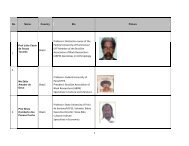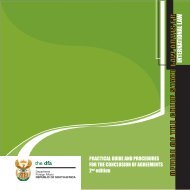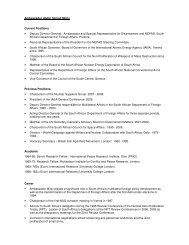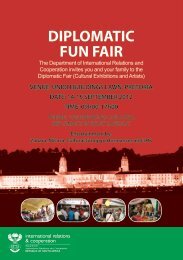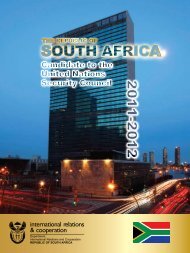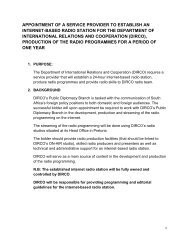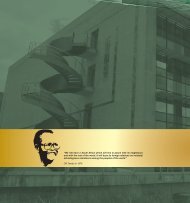Read more - Department of International Relations and Cooperation
Read more - Department of International Relations and Cooperation
Read more - Department of International Relations and Cooperation
Create successful ePaper yourself
Turn your PDF publications into a flip-book with our unique Google optimized e-Paper software.
109. In addition, there is the Financial Intelligence<br />
Centre Act, 2001 (FICA). This Act established<br />
the Financial Intelligence Centre as the national<br />
centre for receiving, analysing <strong>and</strong> disseminating<br />
information on suspected money laundering.<br />
The centre was created in terms <strong>of</strong> section 2 <strong>of</strong><br />
the FICA <strong>and</strong> became operational on 3 February<br />
2003.<br />
110. Financial institutions covered by FICA, referred to<br />
as accountable institutions, are prohibited from<br />
establishing a business relationship or concluding<br />
a single transaction with a customer before<br />
establishing <strong>and</strong> verifying the customer’s identity,<br />
<strong>and</strong> the identity <strong>of</strong> any person acting on behalf <strong>of</strong><br />
the customer or on whose behalf the customer is<br />
acting.<br />
111. In addition, FICA requires institutions to keep<br />
records <strong>of</strong> their clients’ identities <strong>and</strong> their transaction<br />
activities. This ensures that a transaction<br />
or a series <strong>of</strong> transactions can be reconstructed<br />
in the course <strong>of</strong> an investigation, indicating not<br />
only what had happened but also who had been<br />
involved.<br />
112. With respect to politically exposed persons<br />
(PEPs), there are specific requirements that<br />
accountable institutions apply to enhance due<br />
diligence for such higher risk categories <strong>of</strong> customers.<br />
The centre has direct access to commercial<br />
databases that <strong>of</strong>fer further access to<br />
information pertaining to registered legal entities<br />
<strong>and</strong> the composition <strong>of</strong> their governing structures,<br />
credit histories <strong>of</strong> individual/entities, ownership <strong>of</strong><br />
property <strong>and</strong> lists related to PEPs.<br />
C. Suspicious transactions report<br />
113. Section 29(1) <strong>of</strong> FICA requires any person who<br />
carries on a business, manages or is employed<br />
by such business to report to the Financial Intelligence<br />
Centre suspicious <strong>and</strong> unusual transactions<br />
concerning money laundering. The primary<br />
source <strong>of</strong> financial intelligence is suspicious<br />
transaction reports (STRs), which contain information<br />
received from people/entities/accountable<br />
institutions with statutory reporting obligations,<br />
namely 19 categories <strong>of</strong> accountable institutions<br />
as listed in Schedule 1 <strong>of</strong> the FICA as well as<br />
persons mentioned under section 29 <strong>of</strong> FICA. The<br />
Through this Act the laundering <strong>of</strong> proceeds <strong>of</strong> specific drugrelated<br />
<strong>of</strong>fences <strong>and</strong> required the reporting <strong>of</strong> suspicious<br />
transactions involving the proceeds <strong>of</strong> drug-related <strong>of</strong>fences was<br />
criminalised.<br />
24





